Lisa Niver's Blog: We Said Go Travel, page 369
August 27, 2014
A Final Goodbye in Thailand
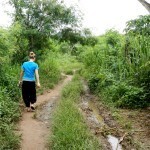
A Final Goodbye in Thailand
Forks were a luxury in a place without toilets or running water. When your daily existence depends upon the secrecy of your location, survival itself takes precedence over dirty hands.
I’d been living in Mae Hong Son province for three months, used to scooping up rice with a bare hand or stabbing fish heads with a flat Chinese spoon. Yet as the students prepared for our good-bye feast, I noticed the cutlery gleaming proudly next to stacks of mismatched plates and glasses.
My co-workers and students in the Karenni National Women’s Organization (KNOW) – a group working to improve the status of ethnic Burmese refugees living inside the Thai border – were technically illegal. They had no right to run a school, reside at an address or carry a passport. No right to be in Thailand at all.
But for just one evening, these security concerns would be ignored. Instead of dining quietly at the big oak table, we pushed furniture and routine aside to celebrate the relationships formed since my volunteer placement began.
Rosie and Shal Gay carefully laid bed mats on the floor as seating, and the erratic electricity became festive lighting.
Even the dinner looked glamorous. My stomach had long adapted to wild ingredients, from small birds to the “jungle beast” that turned out to be one unlucky monkey. But the meat strips now sizzling on hotpots cost money: chicken thighs, slices of beef – and was that bacon?
“Thebwe, thank you so much for everything.” I gestured at the spread with open palms, honored at the optimistic sendoff.
“We want to show thebwe to you, too.” Mie Mie retrieved a surprise bottle of Coca Cola from the fridge. “Where are you going tomorrow?”
Traveling was a rarely-discussed subject. For many of the students, the concept had been misconstrued by ten or more years in a refugee camp. To wander for pure entertainment – and not to escape a military regime – seemed utter extravagance.
“Bangkok, a stopover in South Korea and then home,” I explained.
“You are so lucky to be American. You are free to go anywhere in the world.”
Mie Mie’s frank admiration stopped the pre-programmed moan in my throat. I typically responded to such statements by quoting the limited number of working visas I could get, or how difficult it had been to enter Myanmar last month. Only in comparison to the limitations of my co-workers did a U.S. birth suddenly sound appealing.
“You will remember us after you go? We will miss you, Teacher,” Shal Gay chimed in.
Embarrassment flooded my cheeks. Why was I leaving? Because three months felt like an eternity after years on the road? Or, because it was easier to hide behind the bravado of a departure, rather than challenge myself by staying?
“Of course! I will never forget any of you. And one day, I promise I’ll be back to help the Karenni cause…”
I also wanted to promise that, like them, I didn’t need a passport. I would burn mine up, or rip out the pages and watch them wash down the open drain that ran through KNWO’s outdoor kitchen.
But I couldn’t. That blue book – the one I sometimes flipped through with glossy sentimentality, rubbing visas and studying faded dates – was my ticket to independence.
“Soon, you will get your visas and can visit me in the States!” I teased Mie Mie, hinting at a joyful reunion we had no control over. Her family waited patiently for official U.N. Refugee Status. Until then, the only trips she could take were clandestine jaunts between the office and camp.
“We will see.” She grinned and shrugged with typical Karenni fatalism.
Mi Nyo called out the beginning of dinner. Tongs hungrily snatched up the roasting meats, mingling spices into the air with wisps of different languages. The students wrapped me up in a handmade longyi and I, surprised by a sudden wetness at the corners of my eyes, repeated my promise to return someday.
Later, after the forks found their way back to the cabinet and bare feet shuffled students and teachers off to bed, I considered this vow.
During the previous months, I’d practiced the ritual 100 times: scribbling in my journal one final promise to cherish other people and return to other places. Always convinced that a fearless explorer sought out new destinations, while a cowardly one contentedly stayed behind.
For once in this journey, I recognized how tentative such courage could be. At 7:00 tomorrow morning, the honk of the town’s only tuktuk would signal my release. At that moment, remaining here would require more audacity than driving away.
So in the end, I wrote nothing. Memories meant more than words. Stretched out under the mosquito net, I fell asleep with my passport in my hand.
About the Author: Kelli’s parents lament the fact that their desk-working, mortgage-paying daughter was traded at birth for the perpetually moving, always broke girl who now writes home… Unwilling to settle down in small town USA, Kelli would rather live out of a backpack than a closet. And so she continues searching for fresh stories, smiling faces, spicy foods and reasons to celebrate.
Thank you for reading and commenting. Please enter the Independence Travel Writing competition and tell your story.
The post A Final Goodbye in Thailand appeared first on We Said Go Travel.
Choosing the Southwest Airlines Card that Matches Your Travel Lifestyle
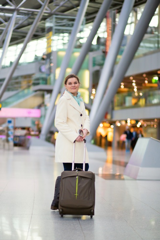 Southwest Airlines is currently the largest domestic carrier in the U.S. They attract the flying public for a number of reasons. First, customers enjoy their competitive pricing and variety of expanding flight routes. Second, standard amenities are the norm, not the exception, on Southwest. These include free baggage checks on your first two bags, no charge for choosing your seat, and no blackout dates. Third, Southwest uses innovative new technologies, like e-boarding passes that use mobile apps for customer convenience. Finally, Southwest offers a great rewards program that is constantly updating itself to benefit the flying public. Here are three credit-card offers that provide different ways to save money on Southwest flights and other purchases your travel lifestyle necessitates.
Southwest Airlines is currently the largest domestic carrier in the U.S. They attract the flying public for a number of reasons. First, customers enjoy their competitive pricing and variety of expanding flight routes. Second, standard amenities are the norm, not the exception, on Southwest. These include free baggage checks on your first two bags, no charge for choosing your seat, and no blackout dates. Third, Southwest uses innovative new technologies, like e-boarding passes that use mobile apps for customer convenience. Finally, Southwest offers a great rewards program that is constantly updating itself to benefit the flying public. Here are three credit-card offers that provide different ways to save money on Southwest flights and other purchases your travel lifestyle necessitates.
Southwest Airlines Rapid Rewards Plus Credit Card: This economical Southwest Rapid Rewards card provides outstanding benefits for travelers on a budget. Currently, new members can receive 50,000 bonus points after spending $2,000 during the first three months of card membership. According to Southwest’s site, that would cover two average round-trip flights when redeemed for Southwest’s Wanna Get Away Fares.
The card has a reasonable annual fee of $69, which is less than that of many similar cards. Cardholders receive a 3,000 point anniversary bonus at the end of their first year of membership. The points keep on coming, though, with double points earned on purchases from Southwest and its hotel and car-rental partners. All other purchases earn one point for each dollar spent, and for a limited time, customers can earn up to 10,000 points on balance transfers at a rate of one point for every dollar transferred.
Now that all these points are stacking up, the choices for how to use them are also impressive. Opt to use these for fare discounts on Southwest flights and save even more money or redeem them to purchase hotel accommodations, car rentals, gift cards, or international flights on more than 50 global carriers in over 85 destinations.
 Southwest Airlines Rapid Rewards Premier Credit Card: At first glance, the Rapid Rewards Premier card may appear similar to the Rapid Rewards Plus version. The introductory bonus is presently the same, earning 50,000 points when spending $2,000 in the first three months the account is open. Card members will also accrue points in the same manner, with double points per dollar for Southwest-approved purchases and one point for all other merchandise and transactions. So what are the differences between the two cards?
Southwest Airlines Rapid Rewards Premier Credit Card: At first glance, the Rapid Rewards Premier card may appear similar to the Rapid Rewards Plus version. The introductory bonus is presently the same, earning 50,000 points when spending $2,000 in the first three months the account is open. Card members will also accrue points in the same manner, with double points per dollar for Southwest-approved purchases and one point for all other merchandise and transactions. So what are the differences between the two cards?
Well, it should be noted as per MileCards.com that program perks for this Southwest Rapid Rewards card are designed for the frequent flier who requires travel options that accommodate a busy lifestyle. Essentially, the more you use this card for travel, the more points you earn that qualify you for A-List or A-List Preferred status. For every $10,000 in purchases, Premier cardholders earn 1,500 tier qualifying points, up to 15,000 TQP annually. Fliers earning 35,000 TQP in one year receive A-List status and the following perks: priority check-in, reserved check-in, standby priority, fly-by priority Lanes where available, a dedicated A-List phone line, and a 25 percent earnings bonus on all eligible Southwest flights. Fliers earning 70,000 TQP annually gain A-List Preferred status. In addition to all of the perks given to A-listers, they will enjoy free Wi-Fi in flight when available and an increase to a 100 percent earnings bonus on all eligible Southwest flights.
Premier Rapid Rewards members also receive a 6,000 point anniversary bonus at the end of their first year of membership which somewhat offsets the $95 annual fee. Overall, this card is a good option to consider for frequent fliers who may desire the extras that make traveling by air more convenient, comfortable and flexible.
The Chase Sapphire Preferred Card: For many cardholders, having a co-branded airline card isn’t a necessity, yet they want to take advantage of special airline offers when possible. The Chase Sapphire Preferred card is just such a card. It offers an introductory 40,000 point bonus for spending $3,000 in purchases in the first three months of use, and cardholders can earn 5,000 more points by adding an authorized user who makes a purchase on the account within the same time frame. At the end of the first year of membership, cardholders will also receive a point bonus of 7% for all the points earned, including those redeemed, within the first year of membership. Added to that, Chase’s card earns double points for all purchases, not just those associated with airline purchases. The card also has a $99 annual fee that is waived for the first year.
For traveling, the Chase Sapphire Preferred allows transfer of points to Southwest and five other major airlines, and it also gives discounts on Amtrak fares and partner hotels. Those who travel abroad will also like the added convenience of carrying a card with a chip and signature feature for international transactions. This card demonstrates the flexibility to suit the needs of frequent fliers but also has the economic benefits that budget-minded cardholder’s desire.
Credit-card offers come and go, but these offers allow you to take advantage of Southwest’s great fares and programs while keeping some change in your pocket. Consider which one suits your travel lifestyle the best while offering the perks and benefits you’ll use the most.
The post Choosing the Southwest Airlines Card that Matches Your Travel Lifestyle appeared first on We Said Go Travel.
Bravery in Malawi

I’m sure my parents won’t like to hear this but taking risks is part of experiencing the world. To quote a favorite movie of mine, “A life lived in fear, is a life half-lived.” I keep reminding myself of this when I question putting aside my anxieties and having faith that something will work out well, versus playing it safe and missing out on an experience. Certainly a healthy dose of caution is advised, especially when traveling in a third-world country and in situations regarding drinking water and wildlife, but in order to truly capture an experience, sometimes you need to check your fear with your luggage.
Last year when I quit my job, subleased my apartment, and bought a one way ticket to Africa, I didn’t think of it as brave, as many people remarked, but necessary for me to broaden my horizons. The alternative to embarking on a trip by myself for several months with a loose itinerary was not going. And that would have only led to regret. So I let go of my inhibitions, and found myself in situations that I would never be in at home, because I allowed myself the freedom to trust to create a deeper experience.
What I quickly learned was that mustering the courage to step outside of my comfort zone gave me access to so much more than just seeing the sights. And what others perceived as bravery, I felt more deeply as a privilege – to have the means to visit other countries and spend time with locals.
Brave was the craftsman in Malawi who followed me home, even after I repeatedly said no to his heavy salesmanship, because he hadn’t eaten. What was a couple dollars to me was his sustenance for another day. I think of his tenacity every day back at home when wasting food or being gluttonous.
Brave was the Tanzanian woman who handed her baby to me on a crowded local bus. Her trust of a stranger allowed me to momentarily feel a part of the culture where community is so important. I am reminded of her welcoming gesture when in public settings where heads are buried in electronics, oblivious to the person next to them.
Brave was the taxi driver in Zimbabwe who was so proud of his country and concerned with an outsider’s impression, that in his own words, he took a risk in implying dissatisfaction with the current government by speaking fondly of how his country used to be. His tentative answers to my questions reminded me of the freedoms many Americans take for granted.
I find travel to be an invaluable education in that it allows me to learn about myself and my life in comparison to other cultures. The slight glimpse into daily life that each of these new friends provided me, reminded of the liberties we are afforded in the US. It took little courage to uproot my life and spend a few months learning about the wider world, knowing I could return to the security and comforts of the US. In contrast, the people I met who shared their time with me, were the brave ones – finding freedom despite adversity.
Thank you for reading and commenting. Please enter the Independence Travel Writing competition and tell your story.
The post Bravery in Malawi appeared first on We Said Go Travel.
August 26, 2014
The parched sand of Tahrir Square, Egypt

Cairo’s Tahrir Square is an uninspiring sandbox, lacking any color or foliage. It is surrounded by unloved concrete and internationally-notorious traffic. It is a feeble place to launch a revolution.
But in 2011, Tahrir Square became an Earthly portal linking mortals and the Olympus gods. We jammed drinking straws through the sand and sucked up the liquid freedom that sustains only those blessed to live forever with nothing to lose.
I was a journalism student visiting Cairo in early 2012 just as Egyptians engaged in their first free presidential election campaign.
And what I found there late at night in the streets leading toward Tahrir Square – what you didn’t see after the cable news crews departed for the day – were sidewalk cafes crammed with the country’s new Founders. Thousands of young Cairenes, women and men, sat next to each other in plastic red chairs debating their country’s future.
As an American schooled in formal Arabic, I struggled to translate the sentences zipping through the darkness and cherry-flavored hookah smoke. But my flashcard vocabulary proved unnecessary. When the girl’s red chair toppled backward as she sprang forward, as she sliced the air with her hands in a final, argumentative exclamation, I translated her: Dignity. Self-confidence. Freedom.
The shame that had frozen these Cairenes in their parents’ homes for decades melted into the sand of Tahrir Square.
But trouble seeped up twelve months after the revolution. The Muslim Brotherhood, which initially promised not to run a candidate in the presidential election, unexpectedly changed policy. Every Friday, the Brotherhood’s supporters held huge rallies in Tahrir Square to promote their candidate.
The reformers held desperate counter rallies on Fridays too, and soon a weekly routine set in. The Brotherhood and each reformer party would erect a stage for its candidate. Each candidate got a time slot to give a speech. As the day wore on, the huge crowd’s attention would shift from one stage to another. It was like a battle of the bands.
I watched this from the panoramic view on the second floor of Belady’s café. People would stop by my table take pictures out the window. Mostly rich Cairenes snacked and drank coffee at the tables around me.
One Friday, a young woman came up to me and asked in good English if I would interview her candidate, a leader of a minority party.
She was desperate for media attention, and like a good PR operative, moved on when she realized I was just a student and could not help her cause.
The Friday rallies were peaceful, but dangers rippled beneath the surface. Women were getting attacked. Thieves preyed on the vulnerable.
One Friday afternoon when I was leaving Belady, a surge of people blocked my way out of Tahrir Square. I got caught in the middle of a flash mob. I could not go backward or slide out of the mayhem. I was being pushed from behind and alarm bells went off in my head. Then I realized my wallet had been stolen out of my pocket. I screamed “help!” “Thief!” But the crime was final. I managed to create a scene and barged out of Tahrir Square another way.
But I left Tahrir Square for the last time running back to my room where I could call the credit card company and repair my fractured life.
The young reformers got robbed too. Years later, we know how their revolution played out. Egypt’s democratically elected president was ousted in a military coup. A general runs Egypt now just like Hosni Mubarak did for decades.
If Tahrir Square’s liquid freedom evaporated, then what independence did I gain from that place?
Travel, by definition, is temporary. You go on a trip somewhere and then you return to your daily routine. There is the physical journey of travel and there is the indelible impression it leaves in you years later.
Tahrir Square itself is an uninspiring sandbox. But its indelible impression – branded by the euphoria of cafés and the panic of the stolen wallet – has made me a more independent person each day going forward.
I experienced a revolution and its tragic failure. Now, looking back a couple years later, I realize Tahrir Square infused humility, persistence and maturity in me.
We all face adversity in our daily lives. I believe travel gives us experience to deal with adversity more successfully.
Thanks to Tahrir Square, I have valuable travel experience that will set me free – not tomorrow, not next month, but years from now, when I least expect it.
Thank you for reading and commenting. Please enter the Independence Travel Writing competition and tell your story.
The post The parched sand of Tahrir Square, Egypt appeared first on We Said Go Travel.
Perfect Autumn City Break: London
As a budget traveler, ever since my very first independent trip, I’ve started to learn how to keep my costs down while still affording to travel. I’ve been traveling since I was in University and at that time my only source of money was the freelance work I would do (translations and ghost-writing).
Shoulder season travel
One of the best advice for anyone who wants to travel but believes they cannot afford it is to just choose the shoulder season and not travel during the high season. For Europe, and London in particular, early spring and late autumn are two of the best times to travel to keep the costs down. Technically speaking, the shoulder season lasts from mid-September to November and from March to April.
Sure, you are most likely going to experience the “well-known” London weather – but I don’t exactly suggest to pack an umbrella. A light-weight waterproof jacket is enough to have handy in case the weather does prove to be annoying.
Accommodation
Don’t forget to book the accommodation and flights as far in advance as possible, with a “sweet” period being 6-8 weeks before the intended departure.
And speaking of accommodation, Housetrip offers apartments in London. Especially if you travel as a family or with friends, it would be cheaper to rent an apartment then to look for a hostel or hotel room.
While a double room with share bathroom in an Inn would cost from 192.42 euros / 2 nights for 2 persons on a hostel booking website*, an apartment which can house 4 persons, during the same time – in early October – would cost from 272 euros / 2 nights if rented via Housetrip. Or in other words 96.21 euros per pax in the double vs 68 euros per pax in the apartment. A cleaning fee should be considered (30 pounds for the apartment).
What to do
When in London, don’t miss the famous British Museum, displaying rare and interesting artifacts from around the world. I was particularly fascinated by the area dedicated to the Greeks and Egyptians – those mummies still haunt me (and I’ve been in London in 2011).
Don’t miss the Tower of London and the near-by Tower Bridge , two of London’s iconic landmarks.
And after a day spent exploring museums, you can indulge in some pub food, particularly the very famous fish and chips. Have a pint of local beer or cider on the side.
From late October to early November, you can enjoy and photograph the fall foliage, when autumn is displaying her lovely colors. One of the best places to do so is Hampstead Heath . You can spend hours exploring this area and don’t forget to go atop Parliament Hill for some of the best views of the city.
Victoria Park is another wonderful place to see the nature’s colors at their best. The picturesque lake, the fountain and the interesting trees will make for great photo opportunities.
Hyde Park and Kensington Gardens are also worth exploring. The lake, the many statues and the lovely trees will keep you occupied for some time.
And while you are walking in the area, make your way to Buckingham Palace to watch the changing of the guards. Spoiler alert: the winter attire is not red, unfortunately.
Note: *prices valid at the time this article was written
The post Perfect Autumn City Break: London appeared first on We Said Go Travel.
Freedom Fog in the USA
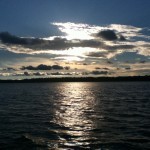
Freedom fog in the USA
I woke up early on that magical morning and looked out the window of my grandparents’ lake house in Manitowish Waters, Wisconsin. That is, I tried to look out the window, for all I could see was a wall of white. The window squeaked as I rubbed it with my nine-year-old hand, checking for condensation, but it didn’t clear. It was fog, the thickest I had ever seen.
I went downstairs to find my grandpa, ‘Bubba’, waiting for me. He was large and balding, fitting the stereotype of a retired fisherman well.
“Are you ready to go fishing?” He asked me in his usual, excited manner.
I glanced out the window and then back at him. “Even with the fog?”
He just smiled in that way of his, the plastic container of worms in his hand, and strolled
out the door. I grabbed my fishing pole and followed suit.
He disappeared from view as soon as he left the house. I followed somewhat nervously, walking down the short sand path to the pier.
There had always been some fog on the lake early in the morning, but never like this. As we pulled away from the pier, it became just the two of us and the boat. We could not see where we were going, and resolved to drifting. The lake had the control. We were free. Free from obligations, free from responsibility. Now that was fishing. It was wonderful.
We would cast our lures into the fog, watching them disappear in pursuit of the elusive muskie, the “fish of ten thousand casts.” While fishing we were quiet, as fishermen are, but nothing needed to be said. Bubba and I were enjoying the moment, entranced by the fog, and free from the rest of the world. It slowly began to clear, and the tops of trees became visible across the lake, one at a time, a painting in progress. With each brushstroke more and more of the shore became visible, until eventually we could see clear across. The fog was gone, and a few years later Bubba would be as well. That’s just the way things go. Nothing can stay. We have to enjoy life while we can.
Now, I see the fog clearing in the morning and rolling in at night and smile, remembering that morning fishing with Bubba. It was a freeing experience, even though we didn’t catch anything.
To this day, fishing the lakes of Manitowish Waters, Wisconsin grants me peace. It gives me freedom, a way to escape the pressures of everyday life. When I am free from outside pressure, I am able to be my true self. There are no judgments. There is only passion. That is why people travel. We need a chance to be ourselves once in a while, to be free. For me, Manitowish Waters offers this freedom. For others it may be an island in the Caribbean, a quaint town in Spain, or even their own back yard. It is important that we find our place and cherish it. So, if you will please excuse me, I have a train to catch. My hook has been dry for far too long.
About the Author: Daniel Szydlowski lives in a Chicago suburb, and always makes time to fish. He is on his high school’s fishing team, and balances out his fishing life with writing, tutoring, tech crew, and science olympiad. He always has fishing on his mind, and even as he wrote this he was wishing he was out on the water.
Thank you for reading and commenting. Please enter the Independence Travel Writing competition and tell your story.
The post Freedom Fog in the USA appeared first on We Said Go Travel.
August 25, 2014
Independence: Feeling Free in the USA

Independence: Feeling Free In the USA
Sometimes I feel as if the world isn’t spinning for me anymore. It’s as if the world is spinning but I’m not moving with it. I begin to feel congested with shallow thoughts that ultimately don’t matter, but I know how to always bring myself back. I know how to stop myself from drowning in the ocean of complexity. I bring myself to simplicity. A place of no worries. A place of freedom. Freedom from society.
As silly as it sounds my backyard is where I feel free, three acres of untouched land. I could scream shouts of joy, and no one would know. I could scream shouts of horror, and no one would know. I don’t feel suffocated from the world’s evil. I feel free because of the world’s beauty. I think that sometimes we forget how beautiful and free we really are. I think that the human instinct is to achieve the best of your life. To do that we focus on the bad and evil of our life, but maybe the way to achieve the best of life is to focus on the beauty, focus on our freedom. To feel both of those I focus on my backyard.
I asked friends and family members what the word free meant to them. Most responded with things in the manner of “Being able to make decisions for myself.” I agree with the response but I feel as if it doesn’t cover half of what I want to say. I haven’t been enslaved or imprisoned, yet I feel as if I can still define being free. Being free is turning away from the face of evil, smiling in the storm, standing up after every fall. Being free is like riding a never ending wave. We feel like the wave is standard, that everyone has it. When really the wave is a privilege.
The dictionary definition of freedom is the power or right to act, speak or think what one wants without restraint. I couldn’t define it more perfectly. In my backyard I don’t have to worry about what others think. I don’t have to think about my ultimately small issues. I can think what I want. I can speak what I want. I can do what I want. I feel free.
My hope for the world is that everyone has a place to feel free. Feeling free is a precious blessing. I am very thankful that I can feel safe and free in my backyard. I understand that everyone doesn’t have the blessing of being and feeling free. I am very proud to live in the United States because of my freedom. I want to thank them for risking their lives so I can feel free. I know that my freedom wasn’t gained easily. I promise I won’t waste my freedom.
I would like to wish everyone a happy Fourth of July.
I would also like to thank every man and woman who is and has fought for the United States.
About the Author: My name is Abby Berry. I am a 14 years old. I wish to become an author when I am older. I hope to go to collage for Journalism.
Thank you for reading and commenting. Please enter the Independence Travel Writing competition and tell your story.
The post Independence: Feeling Free in the USA appeared first on We Said Go Travel.
The Yauri I will never forget in Nigeria
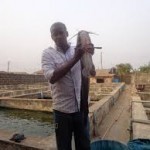
Do you know that a bird on hand is much better than many on tree? At times, giving eyewitness account only reduces a story to nothing but understatement or exaggeration. In the past, I’ve heard too many stories from my friends about their tour to various places where they could be themselves however it only poisons my blood to induce effect. Happily for me, I’d grabbed a bird. Here is it.
In 2013, I was mobilized to another part of my country by the Federal Government of Nigeria. Though, it was a 365 days compulsory national assignment (NYSC) which a focus on youths. That gave me an opportunity to travel from Lagos state through Kwara and Niger state respectively. Initially, the adventure instilled fear in me. My eyes were filled with tears and the tears were full of fear but thankfully, I found freedom in Kebbi state.
I know the world has other aims for me because “where there is a will, there is a way”. With that boldly printed in my mind, I was inspired to travel. I turned a new leaf. Then I travel.
The first discovery that attracted my attention, on the way was the gradual change of the geographical factors such as weather as I travel along. I saw drastic change, as the forest started fading, dropping all to savanna. Looking up at the sky, the protective bluish and cloudy weather of the south had somehow faded to an aggressive plain and white blanket, giving room for sun to bite hard on the skin. It took eight hours before I finally arrived at my destination (Kebbi state).
Yauri is a town in Kebbi state which is situated on a fairly high altitude. The major occupation of the citizenry is Agriculture especially in my dreamed profession; fish-farming. Whoa! Then, I said behind the scene that “by God’s grace, I will explore in this peaceful land”. The citizenry of Yauri are very humble, social, kind and accommodating. In addition, the town is blessed with too many natural resources such as gold, tin; copper, to mention a few.
The subsequent day, I was taken to a farm where I observed there was no need to make heaps before the plantation of arable crops. Yams were easily harvested from the soil, being that it was sandy. While on the farm, I was amazed. I saw a young boy of about five year’s old leading flocks of sheep, goats and cattle. That was very strange to me!
Later in the afternoon; on that same day, I was taken to a very big fish pond where I was taught the fundamentals in fish-farming business. Do you know that for a very long period ago, I’d suffered to learn fish-farming. By then, nobody was willing to assist but majority of the professionals I came about always seek to amass wealth through that “touch and go business”. I was very curious to learn and due to my curiosity, I successfully acquire the required skills from my friendly Yaurians within 30 days. Do you know that I was given full accommodation for one year even still I was taught what many University Professeurs of Fisheries lacks in practical knowledge.
Shortly afterward, I came to that point in my life where I had to make decisions for myself. It was those decisions that tempted me to set up my own fish farm. As I type this essay, grins of joy smiles on my face. Too much that is devoid of gin. I thank God for I’m freelance. I’m a fish farmer. I’m a business tycoon. What could have been of me if I had sidestepped the NYSC scheme? Or had not been open to learning about myself and another culture of people? Truly, life is a journey, not a destination. But that does not mean that life should be an aimless journey.
Through my journey in life and the journey of my life, I’d met too many challenges but I didn’t throw in the towel. Due to my sacrifice, I found my freedom. I’m very happy. In fact, if not that I’m free; I will definitely not write in this essay rather, I’ll be struggling round the clock in order to “make ends meet”. Honestly speaking, rural lives should be the priority for urgent development, where many human resources are largely unutilized and lamentably wasting away.
Indeed, “where there is a will, there is a way”. My will is to be freelance in life. Thank God that I found it in Yauri. In fact, as I type this, I’m very happy.
Thank you for reading and commenting. Please enter the Independence Travel Writing competition and tell your story.
The post The Yauri I will never forget in Nigeria appeared first on We Said Go Travel.
Free to Swim or Sink in the USA
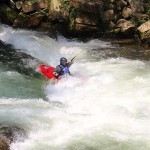
Free to Swim or Sink in the USA
The water on the Ocoee River in eastern Tennessee was higher than usual.
Luckily, higher water on this river meant my chance of meeting a rock while upside down was lessened. I sat in my borrowed whitewater kayak and, just below me, there was a fall aptly named “Table Saw.” To seasoned paddlers who were used to the Class III feature, this was just an exercise for larger rivers. But for me, this was the biggest water I’d taken-on in a small kayak.
I clung to a twig on the inside edge of a smooth eddy and wished my friend luck as he pushed away. I would bring up the rear. He disappeared over the edge in a torrent of water and, suddenly, my arms tingled and throat clenched.
I was next. I sat alone and quietly cursed. What had I gotten myself into?
We drove into the area the night before while the dam-fed river was slowed to a trickle, exposing the rocky feature underneath: sharp, angled edges pointed downriver to form a chute resembling a cheese grater. If an injury happened here, it notoriously left noticeable marks on the face and head. While I may have looked like an experienced whitewater paddler outfitted with good gear and full-face helmet, I was as novice on this river as a paddler could be. And I was definitely feeling pressure from a challenge I’d never known.
After some time and rafters passed, I finally received the “go” signal from my safety kayaker at the bottom of the run. I took a deep breath and swallowed my doubt, turned the kayak’s nose into the current, sternly planted my head forward, and let the water carry me into an adventure.
***
Water shapes me. Through courage and fear, humility and strength, turmoil and peace, it shows me how to tread past the unexpected. I seek water when needing perspective. It’s where I go to get away. It’s where I play when I need to be challenged, humbled, or bolstered with new confidence. Plus, it runs through my veins, literally and symbolically: feeling currents pulse, smelling rivers and oceans close by, tasting flavors imbued from natural surroundings… water has a pull all its own.
More than once, the Buffalo River in Arkansas with its high limestone bluffs, turquoise clear water, and quiet corners offered reflective solace and stoic guidance when difficult emotions surged. A deep, dark cenote in Mexico blasted the grief of my father’s death out of my body in a way only frigid water can; I threw myself in as many times as I could muster. The Indian Ocean tore me off my feet in South Africa, demanding respect for its power and character.
Water strips me down to my most basic and simplistic pieces when needing to be freed of life’s heaviness. In these moments, it reminds me that, although I’m only a small part of a big world, I’m still uniquely me: free to choose my experiences, my growth, and my path. As paddlers frequently utter together, everyone swims: kayaking is just the time spent in between those swims.
***
My choice of path down Table Saw needed adjustment, to put it lightly. Time slowed as my kayak launched over the first large wave, flipping me in midair. Upside down, my roll failed three times while water thundered with churning whites, greens, and browns. I was disoriented in the falls, lungs burning, and I knew I had to swim. With one hand tight on my paddle, the other gripped the spray skirt pull and I yanked hard. Cold water instantly grabbed my lower half and I was free to tumble, to spin.
Bobbing up, I was at the bottom of the run unhurt and less scared. My safety man was there, urging me to swim aside as he caught my kayak. A raft-full of tourists cheered and I smiled and waved unabashed. The descent wasn’t pretty, but I did it. Everything that day – fear, joy, gumption, and exhaustion – bolstered the desire to get back in that kayak. Water and I played rough and, so long as I kept paddling, I was free to swim or sink.
About the Author:
Cristen Jester is a writer, biologist, life coach, and new mom. She resides in Nixa, Missouri, and thrives off of time with her family, the outdoors, and traveling near and far.
Thank you for reading and commenting. Please enter the Independence Travel Writing competition and tell your story.
The post Free to Swim or Sink in the USA appeared first on We Said Go Travel.
August 24, 2014
Wide Open Spaces in Argentina
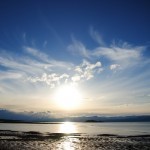
When was the last time you were in complete and utter silence? The last time you saw nothing but nature surrounding you with nothing man-made besides the clothes on your back? Have you ever been in such a place?
This may all sound very underwhelming…but in fact in can be one of the most overwhelming experiences.
We live in a world of desires, always chasing what we don’t have, or looking for something that seems beyond our reach, when it might be sitting within us all along.
Having come from a large bustling Asian city, I found my place of freedom a long long way away. For some, the bright lights of the city create that dream of freedom and independence. Cities have diversity, subcultures, security, and opportunities. Perhaps I’ve been in Hong Kong for too long and it’s become far too familiar, and claustrophobic. My vision of freedom and independence has changed. When I landed in this metropolis, I was free to explore and discover, but then it settled down and became normality.
Nowadays, put me in a wide open space, and that will inspire me. Open skies and freedom of space, pondering where life will take me next. That is one of the joys of freedom and independence; making choices. Making your own choices, however they are inspired. A privilege that can never be taken for granted.
In my place of freedom, I was surrounded by snow-capped mountains, breathing in crisp, clean air making me feel alive. I was far from home in the Southern part of Argentina; Patagonia. It may not be a place of permanency for me, but it’s a place I can always take myself back to visually. A place where I felt small, and insignificant in this vast world. This inspired independence, confidence and freedom. A canvas on which to dream and discover, to be who and what I want to be.
I sit quietly on a frosty rock, not noticing the chill through my veins. The flamingos in the distant lake change from leg to leg, the only movement is the ripple in the water, with no sound. I feel grounded, centred, humbled. It seems that between me and these mountains there is a wealth of opportunity that I have not yet worked out how to reach, but I aspire to. This gives me the drive to be independent, to work out my own way of grasping the opportunity because just as with my vision, there is nothing to obstruct it.
It might be fair to say I feel independent in my own home, singing in the shower, or in my mothers embrace, but these are actions that are temporary; it is the feelings and the memories that are permanent. Freedom and independence is something within that you can take with you wherever you are in the world. I found my spirit of independence in Patagonia when I felt most humble and vulnerable.
Sometimes the place where you think you have nothing is actually the place that you find the most; where you are free.
About the Author: I am from the UK, currently residing in Hong Kong. I am a keen photographer and writer, and I love to travel.
Thank you for reading and commenting. Please enter the Independence Travel Writing competition and tell your story.
The post Wide Open Spaces in Argentina appeared first on We Said Go Travel.
We Said Go Travel
We Said Go Travel is a global community of over sixteen hundred writers with articles from every continent.
Stories are shared with photos and video from a perspective of the transformative power of travel. We Said Go Travel has hosted live and online events as well as travel writing contests around the world. ...more
- Lisa Niver's profile
- 57 followers





